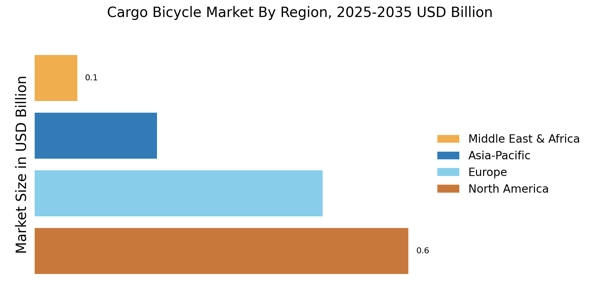E-commerce Growth
The exponential growth of e-commerce is significantly impacting the Cargo Bicycle Market. As online shopping continues to rise, the need for efficient delivery solutions becomes paramount. Cargo bicycles are emerging as a viable option for last-mile delivery, particularly in urban settings where traffic congestion poses challenges for traditional delivery vehicles. Data indicates that the e-commerce sector is projected to reach a valuation of over 6 trillion dollars by 2024, which could lead to increased investment in cargo bicycle logistics. This trend suggests that businesses may increasingly adopt cargo bicycles to meet consumer demands for faster and more sustainable delivery options.
Urbanization Trends
Rapid urbanization is reshaping transportation needs, thereby influencing the Cargo Bicycle Market. As more people migrate to urban areas, the demand for efficient and space-saving transport solutions increases. Cargo bicycles offer a practical alternative for last-mile deliveries and personal transport in congested city environments. Recent statistics indicate that urban areas are expected to house nearly 70% of the global population by 2050, which could lead to a surge in cargo bicycle adoption. This trend suggests that municipalities may increasingly support cargo bicycles through infrastructure improvements, such as dedicated bike lanes and parking facilities, further enhancing their appeal.
Government Initiatives
Government initiatives aimed at promoting sustainable transportation are likely to bolster the Cargo Bicycle Market. Many governments are implementing policies that encourage the use of bicycles, including cargo models, through subsidies, tax incentives, and infrastructure investments. For instance, several cities are developing comprehensive cycling networks and offering financial support for businesses that utilize cargo bicycles for deliveries. This proactive approach not only enhances the visibility of cargo bicycles but also positions them as a key component of urban mobility strategies. As these initiatives gain traction, the market for cargo bicycles may experience accelerated growth, driven by both consumer and business adoption.
Environmental Awareness
The increasing awareness of environmental issues appears to be a driving force in the Cargo Bicycle Market. Consumers are becoming more conscious of their carbon footprints and are seeking sustainable alternatives to traditional vehicles. This shift in consumer behavior is likely to boost the demand for cargo bicycles, which are seen as eco-friendly transportation options. According to recent data, the cargo bicycle segment is projected to grow at a compound annual growth rate of approximately 10% over the next five years. This growth is indicative of a broader trend towards sustainable urban transport solutions, as cities implement policies to reduce emissions and promote greener modes of transport.
Technological Innovations
Technological innovations are playing a crucial role in shaping the Cargo Bicycle Market. Advances in battery technology, electric assist systems, and smart connectivity are enhancing the functionality and appeal of cargo bicycles. Electric cargo bicycles, in particular, are gaining traction as they offer an efficient means of transporting goods over longer distances without the physical strain associated with traditional bicycles. Recent market analyses suggest that the electric cargo bicycle segment is expected to witness a growth rate of around 15% annually. This trend indicates that as technology continues to evolve, cargo bicycles may become increasingly integrated into urban logistics, further solidifying their position in the transportation landscape.

















